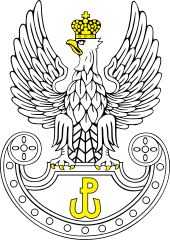Territorial Defense Army
The Territorial Defense Army , also territorial defense troops ( Polish Wojska Obrony Terytorialnej , short WOT ) is a part of the Polish armed forces .
organization
“Patriotic Poles” with and without a military career are to be recruited, who appear in the rotation system once a month for education and training and who are supposed to report their whereabouts outside of this time.
Even in 2016 we want in the provinces Podlaskie , Lublin and Subcarpathian three WOT brigades and four battalions in Białystok , Siedlce , Lublin and Rzeszów up with 3,000 volunteers who will command 413 professional soldiers. In 2017, three brigades with 18,000 men would be added.
These people are to be recruited from the working population and trained and trained for 16 days and one weekend a month. In the WOT, men with health impairments could also serve, for whom the way into the professional army is closed, provided they have special skills. Service in the WOT would last between one and six years and could then be extended. WOT members are to be forbidden from belonging to a political party or union. Their rights to appear in public and to join associations should also be restricted.
In 2019, the WOT will eventually include 53,000 volunteers who will be equipped with uniforms , carbines and anti-tank weapons . The monthly salary for service is 500 zloty for soldiers and 600 zloty for officers. The WOT is to be financed annually with 1.5 billion zlotys from the modernization fund of the Polish army (professional army with 95,600 people, 4800 of them women). Between 2016 and 2019 that would be a total of 3.6 billion zlotys.
Areas of application
In case of war, they are supposed to support the Polish army. The Polish Defense Minister Antoni Macierewicz justifies his WOT plan with the Russian-Georgian war of 2008 and the Russian-Ukrainian conflict since 2014 . He also regards the WOT as a school of patriotism. According to the ministry, the WOT is also intended for "non-military threats". According to the Ministry of Defense, this includes “igniting nationalist and religious disputes, information attacks on society and attempts to destabilize the internal situation in the state.” All of these tasks are the responsibility of the police. Since the WOT should initially report directly to the minister and not directly to the generals like the Polish army, ex-defense minister Bogdan Klich fears that Macierewicz would like to use the WOT for his domestic policy.
High command
On September 20, 2016, Defense Minister Antoni Macierewicz entrusted Colonel Wiesław Kukuła with the high command of the WOT to be founded. He was born in Częstochowa , graduated from the Wyższa Szkoła Oficerska Wojsk Łączności Military Academy and the WAT Military Academy , and then served in the 1st Special Regiment ( 1st Pułk Specjalny ). After an Iraq mission in 2006 he moved to the command command of the special forces ( Dowództwo Wojsk Specjalnych ). In 2012 he took over command of the Jednostka Wojskowa Komandosów special unit in Lubliniec .
Founding history
On November 4, 2016, the Sejm dealt with the law on the establishment of the army for territorial defense and referred the draft to the Defense Committee. 160 MPs from Platforma Obywatelska and Nowoczesna have called for the draft to be rejected. However, they could not prevail against the 251 votes of the parties PiS and Kukiz'15 . On November 4, the first 66 WOT officer candidates, including 21 women, were sworn in in the presence of Deputy Defense Minister Wojciech Fałkowski on the square of the Military College in Wroclaw , although there was no legal basis for the formation of the force. The non-commissioned officers began their service on October 3, 2016. They are trained for their service in the WOT for twelve months.
criticism
On November 4, 2016, in the first reading of the law on the formation of the WOT, the Sejm MP Paweł Bejda from the peasant party PSL asked whether Macierewicz wanted to buy votes with the 35,000 paid fighters to be elected by 2018. Mirosław Suchoń (Nowoczesna) described WOT as "Minister Macierewicz's private army, which would have been withdrawn from the high command". The Polish media interpreted the absence of the army generals at the presentation of the project in the Sejm as a silent distancing from the WOT idea. On November 4, 2016, the Ministry of Defense published a correction on its website according to which the WOT soldiers were not intended to fight social unrest.
Individual evidence
- ↑ Tysiące ochotników, długa lista zadań. Z czym ma walczyć "armia Macierewicza"? at www.tvn24.pl
- ↑ Co dalej z Wojskami Obrony Terytorialnej? Zdecyduje komisja at www.tvn24.pl
- ↑ Pierwsza przysięga przyszłych dowódców wojsk obrony terytorialnej at polska-zbrojna.pl
- ^ Project w sprawie Wojsk Obrony Terytorialnej skierowany do komisji sejmowej at polskieradio.pl
- ↑ Komunikat MON at mon.gov.pl
